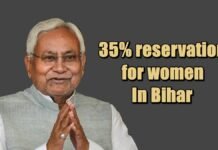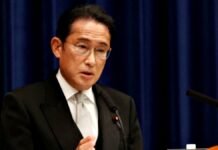
Tokyo: In a significant shift in Japan’s political landscape, Shigeru Ishiba, the newly elected leader of the ruling Liberal Democratic Party (LDP), was officially chosen by Japan’s Parliament as the country’s Prime Minister on Tuesday. Ishiba’s election comes just days after he secured leadership of the LDP, positioning him to replace Fumio Kishida, whose resignation was fueled by mounting scandals and dwindling public support.
Fumio Kishida Steps Down Amid Mounting Scandals
Fumio Kishida formally resigned from his position as Prime Minister early on Tuesday, ending his two-year tenure that had been marred by growing political controversies. His administration faced intense scrutiny over allegations surrounding the LDP’s ties to the Unification Church, which had raised concerns about political influence. In addition to this scandal, the party also faced backlash related to political funding controversies that surfaced in December last year.
Over the past eight months, Kishida’s approval ratings plunged dramatically, hovering at a dismal 20 percent. The lack of public confidence, coupled with internal pressures from the LDP, ultimately led to his resignation. Party insiders expressed concerns that under Kishida’s leadership, it would be difficult to secure victory in Japan’s upcoming general elections scheduled for October next year.
Shigeru Ishiba: A New Chapter for Japan’s Leadership
Shigeru Ishiba, a veteran politician with a reputation for his expertise in defense and national security, takes the helm at a critical juncture for the LDP. After being chosen as the party’s leader on Friday, his appointment as the new Prime Minister was quickly formalized following Kishida’s departure. However, Ishiba faces the immediate task of restoring public trust and stabilizing the party ahead of the upcoming elections.
Ishiba is expected to announce his new cabinet later on Tuesday, and political observers are closely watching to see whether he will bring fresh faces into the administration to signal a break from the scandals that plagued his predecessor. His challenge will be to address the party’s internal fractures, regain the public’s confidence, and steer Japan through key domestic and international issues, including economic recovery and security challenges in the Asia-Pacific region.
The Fallout of the Unification Church Scandal and Political Funding Controversies
Fumio Kishida’s downfall is largely attributed to the Unification Church scandal that implicated several high-profile members of the LDP. The revelations caused a wave of criticism, with many accusing the party of fostering inappropriate connections with the controversial religious group. This scandal, along with unresolved issues over political funding, significantly damaged Kishida’s credibility, further exacerbating his declining popularity.
The controversies not only affected Kishida personally but also cast a shadow over the LDP’s ability to lead effectively. With general elections just a year away, many party leaders felt that Kishida’s continued leadership would jeopardize their chances of success at the polls.
Kishida’s Tenure: From Promise to Downfall
Fumio Kishida assumed the role of Japan’s Prime Minister in October 2021, succeeding Yoshihide Suga. Initially seen as a stabilizing figure, Kishida’s government was tasked with managing Japan’s post-pandemic recovery and addressing various economic and foreign policy challenges. However, the mounting scandals, coupled with a series of unpopular policy decisions, steadily eroded his public support.
In recent months, protests and opposition to his government grew louder, with many calling for fresh leadership ahead of the 2024 elections. Recognizing the party’s dwindling chances under his leadership, Kishida preemptively announced his intent to step down as LDP president and Prime Minister, clearing the way for Shigeru Ishiba to take over.
What Lies Ahead for Japan’s Political Future?
As Shigeru Ishiba steps into the role of Prime Minister, he faces significant challenges in uniting the LDP and preparing for a highly competitive general election next year. His experience and political acumen will be tested as he works to distance the party from recent controversies and rebuild public trust.

With Japan at a crossroads facing both internal political shifts and external pressures, particularly from China and North Korea how Ishiba navigates these complexities will define not only his leadership but the future direction of the country. The coming months will be crucial in determining whether the LDP can regain its footing and secure a mandate for the next decade.



















































